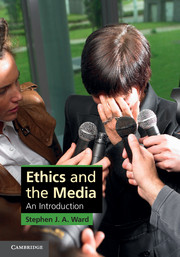6 - The new media ethics
Published online by Cambridge University Press: 05 June 2012
Summary
Over the past three chapters we have examined basic principles: truth, objectivity, and minimizing harm. These concepts are the pillars of mainstream media ethics.
Most of the principles and approaches were developed over the past century, originating in the construction of professional media ethics, as discussed in Chapter 2. Therefore, our discussion has revolved around a traditional approach to ethics developed originally for a news media of another era.
To what extent is this approach to ethics suitable for today’s and tomorrow’s news media? In this chapter we address this question by examining the reasons for concern about the applicability of traditional approaches, and by describing a new, emerging media ethics. In Chapter 4 , we reaffirmed truth and objectivity after we reconceived these concepts. In this chapter we go further and think more radically. We consider to what extent the entire structure of media ethics needs to be rethought and reinvented for the media of today, not of yesteryear.
- Type
- Chapter
- Information
- Ethics and the MediaAn Introduction, pp. 207 - 244Publisher: Cambridge University PressPrint publication year: 2011



